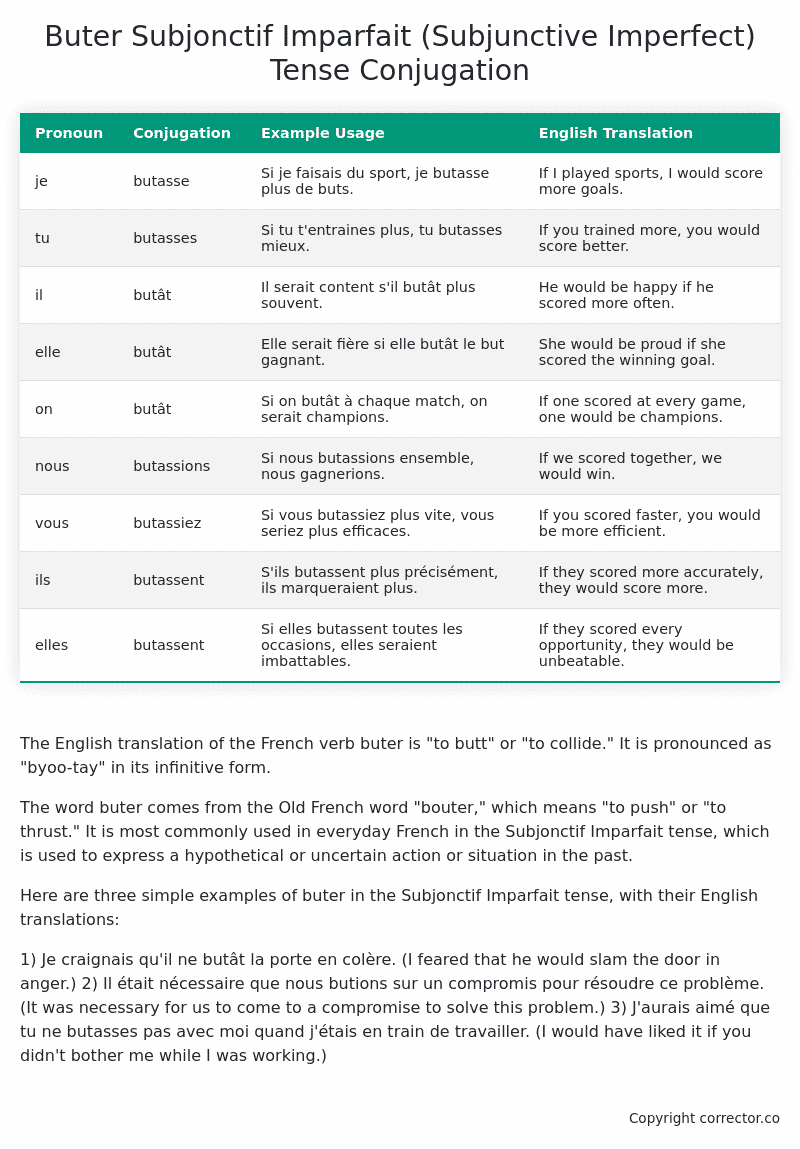Subjonctif Imparfait (Subjunctive Imperfect) Tense Conjugation of the French Verb buter
Introduction to the verb buter
The English translation of the French verb buter is “to butt” or “to collide.” It is pronounced as “byoo-tay” in its infinitive form.
The word buter comes from the Old French word “bouter,” which means “to push” or “to thrust.” It is most commonly used in everyday French in the Subjonctif Imparfait tense, which is used to express a hypothetical or uncertain action or situation in the past.
Here are three simple examples of buter in the Subjonctif Imparfait tense, with their English translations:
1) Je craignais qu’il ne butât la porte en colère. (I feared that he would slam the door in anger.)
2) Il était nécessaire que nous butions sur un compromis pour résoudre ce problème. (It was necessary for us to come to a compromise to solve this problem.)
3) J’aurais aimé que tu ne butasses pas avec moi quand j’étais en train de travailler. (I would have liked it if you didn’t bother me while I was working.)
Table of the Subjonctif Imparfait (Subjunctive Imperfect) Tense Conjugation of buter
| Pronoun | Conjugation | Example Usage | English Translation |
|---|---|---|---|
| je | butasse | Si je faisais du sport, je butasse plus de buts. | If I played sports, I would score more goals. |
| tu | butasses | Si tu t’entraines plus, tu butasses mieux. | If you trained more, you would score better. |
| il | butât | Il serait content s’il butât plus souvent. | He would be happy if he scored more often. |
| elle | butât | Elle serait fière si elle butât le but gagnant. | She would be proud if she scored the winning goal. |
| on | butât | Si on butât à chaque match, on serait champions. | If one scored at every game, one would be champions. |
| nous | butassions | Si nous butassions ensemble, nous gagnerions. | If we scored together, we would win. |
| vous | butassiez | Si vous butassiez plus vite, vous seriez plus efficaces. | If you scored faster, you would be more efficient. |
| ils | butassent | S’ils butassent plus précisément, ils marqueraient plus. | If they scored more accurately, they would score more. |
| elles | butassent | Si elles butassent toutes les occasions, elles seraient imbattables. | If they scored every opportunity, they would be unbeatable. |
Other Conjugations for Buter.
Le Present (Present Tense) Conjugation of the French Verb buter
Imparfait (Imperfect) Tense Conjugation of the French Verb buter
Passé Simple (Simple Past) Tense Conjugation of the French Verb buter
Passé Composé (Present Perfect) Tense Conjugation of the French Verb buter
Futur Simple (Simple Future) Tense Conjugation of the French Verb buter
Futur Proche (Near Future) Tense Conjugation of the French Verb buter
Plus-que-parfait (Pluperfect) Tense Conjugation of the French Verb buter
Passé Antérieur (Past Anterior) Tense Conjugation of the French Verb buter
Futur Antérieur (Future Anterior) Tense Conjugation of the French Verb buter
Subjonctif Présent (Subjunctive Present) Tense Conjugation of the French Verb buter
Subjonctif Passé (Subjunctive Past) Tense Conjugation of the French Verb buter
Subjonctif Imparfait (Subjunctive Imperfect) Tense Conjugation of the French Verb buter (this article)
Subjonctif Plus-que-parfait (Subjunctive Pluperfect) Tense Conjugation of the French Verb buter
Conditionnel Présent (Conditional Present) Tense Conjugation of the French Verb buter
Conditionnel Passé (Conditional Past) Tense Conjugation of the French Verb buter
L’impératif Présent (Imperative Present) Tense Conjugation of the French Verb buter
L’infinitif Présent (Infinitive Present) Tense Conjugation of the French Verb buter
Struggling with French verbs or the language in general? Why not use our free French Grammar Checker – no registration required!
Get a FREE Download Study Sheet of this Conjugation 🔥
Simply right click the image below, click “save image” and get your free reference for the buter Subjonctif Imparfait tense conjugation!

Buter – About the French Subjonctif Imparfait (Subjunctive Imperfect) Tense
Formation
Common Everyday Usage Patterns
Interactions with Other Tenses
Subjonctif Présent
Indicatif Passé Composé
Conditional
Conditional Perfect
Summary
I hope you enjoyed this article on the verb buter. Still in a learning mood? Check out another TOTALLY random French verb conjugation!


